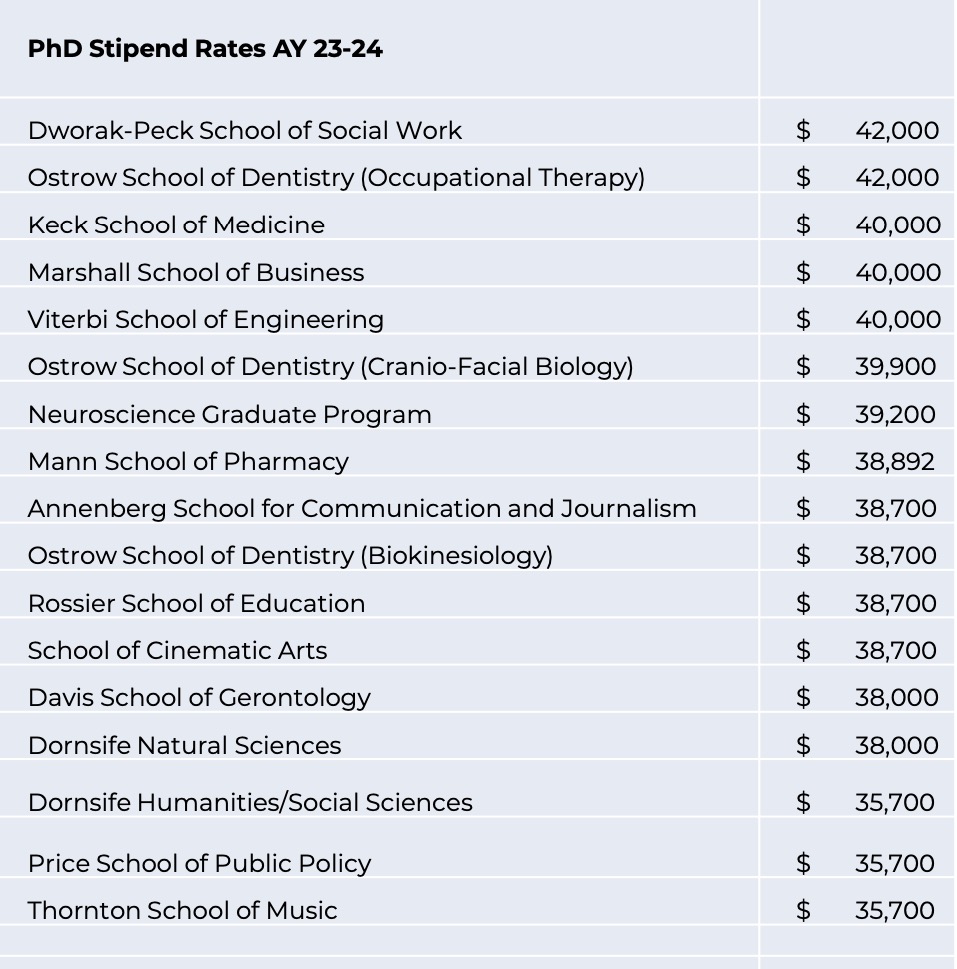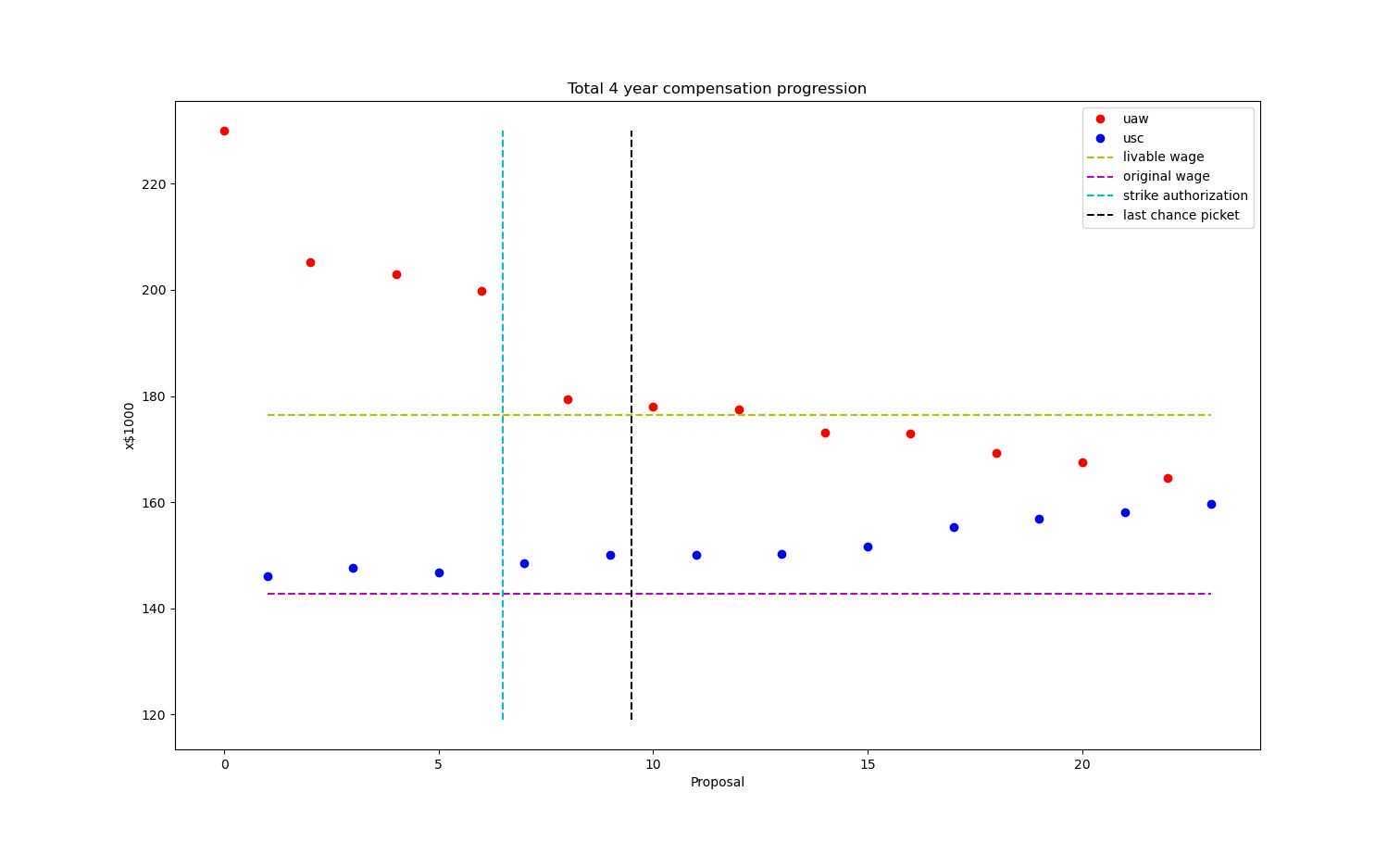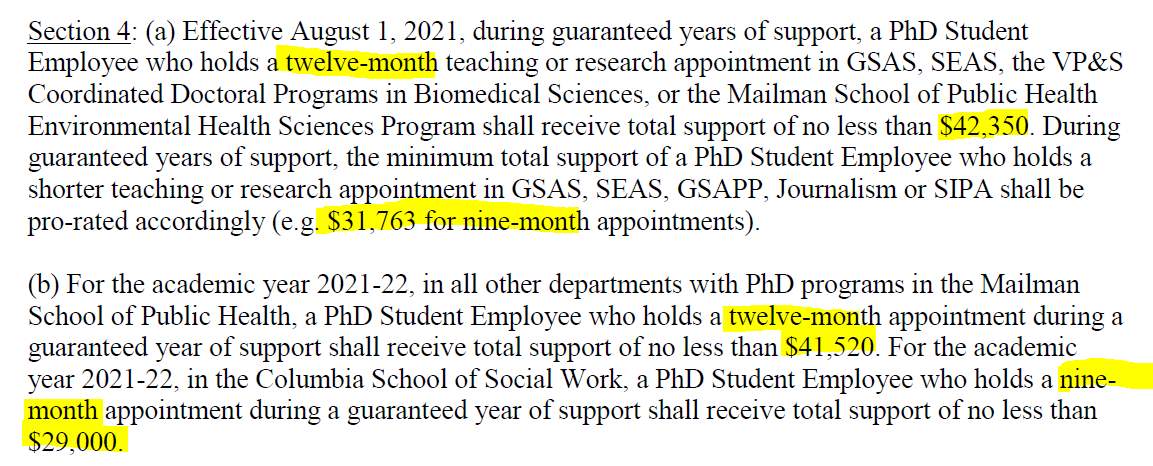Where does this tentative agreement fall short?
Living Wage:
Here is our tentative agreement(TA) [1]:

On our union website [2]:
The current LA County living wage is $44,142.
We will also be beaten by UCLA:
Starting next year (24-25), UCLA TAs on a 9-month appointment with nine months of teaching experience will earn $41,787 annually.
With the current inflation of 3+%, the annual increase could be wiped out easily. Also, many schools are already getting near 40K annually. This contract may brings little wage increase for them.

In the official bargaining update:
USC administration made several major last-minute concessions and agreed to Graduate Student Workers’ key outstanding demands.
However, here is a graphic of how the wage proposal was negotiated (minimum wage was shown in the figure.)

Healthcare:
We want better healthcare. This tentative agreement [3] won a hardship funding. But it failed to achieve any of these:
- less out of pocket fees
- better coverage
- better dental insurance especially.
Let us know if you want to add more things.
For discussion, we encourage you to join GSWOC slack #forum channel, which is open for all GSWs. (Email us for invitation link)
What does it mean to ratify a contract?
Our bargaining team(BT) will present the tentative agreement [4] to the membership (that’s us!) for us to vote on whether we accept or reject it. The vote will be online during December 4th-6th. If you don’t receive the email on Dec 4th, see the second question in the official union vote FAQ.
Can we win something better? (How can we improve)
Voting No means we choose to have a second chance, allowing us to make it better. If we ratify this contract, it will be bonded to us till 2027! According to a BT member, they believe this is the best we can win, because our turn out for the last chance picket, etc. wasn’t good. They don’t think there will be a massive turnout for the strike and our power will peak before it. That’s why they rush into an agreement. But there are many aspects we can improve:
We can be more strike ready
- There is little time between the announcement of the strike date (Nov 13rd) and the actual strike (Nov 28th). Many organizers are ready for the strike, but many union members don’t. Two weeks may not be enough for many people to prepare and save money. We also may not have enough time for one-on-one conversation.
- After the ratification, we can spend several months getting our union members more ready to strike. We can encourage people to start saving from winter break.
- If we choose to have a second chance, it is almost certain that we will strike.
We can be more transparent and democratic
We can invite union members to join the decision making process on wage, etc. In other universities, Columbia and UMich, union members can vote on these important bargaining decisions. Before the final deal was reached, our bargaining team(BT) had never mentioned any details of our wage proposals in their bargaining updates [5].
We can create a safe space for feedback
Organizers in the international student committee did a survey on wage (sent on WeChat on Nov 15th) and found most people who filled the survey were not satisfied. Bargaining team eventually chose to take over the international student committee and archive its email list. Also, a petition was initiated on Nov 21st, asking BT not to lower our wage proposal. Within one day, 31 people signed it. People have voiced concerns that those feedbacks were not taken seriously and BT and organizers attempted to silence their voices.
We wrote more ideas for improvement and timeline for the survey and petition here. Feel free to add your comments & contribute:
Where we can improve & Timeline
Why vote NO on a contract?
A no vote puts pressure on USC to offer more at the table, now that it understands that the unit will not concede. A strong no vote sends a signal to USC that the unit will not settle for a contract that does not give us a living wage and better benefits. Whether you like this TA or not, whether you believe we can win better or not, it is important to vote and make the decision democratically. Usually, the turn out for the contract ratification isn’t high.
What happens if we vote down a contract?
We return to the bargaining table to continue bargaining. Typically with a new bargaining team.
Can USC increase our wage if we are still negotiating with them?
Yes! They totally can. They can not implement any change unilaterally (by themself). But they can certainly do it after discussing with our union.
I really need the wage increase
There is only a $400 bonus for next spring. The wage increase for 24-25 will take effect next Fall, which is 9 months from now. There is no guarantee on how long it will take after No Vote. But it is reasonable to believe it won’t be longer than this one(see the next question). After No Vote, people at Columbia spent 8 more months to win a new contract. [6] Their timeline is listed at the end of this google doc.
Does a No Vote mean that we start from zero in negotiation?
No. USC cannot legally retract anything. (Note: We made a mistake earlier.)
USC withdrawing tentative agreements just because we don’t ratify is regressive bargaining.
Regressive bargaining is strong evidence of bad faith bargaining, because they are not trying to reach an agreement, which is illegal. USC can choose to do so at any time, what will stop them is our collective power. We can file an Unfair Labour Practice (ULP) complaint to the National Labour Relations Board (NLRB).
If USC refuses to return to bargaining after a No Vote, that’s called declaring an impasse, which is legal if it is about mandatory subjects of bargaining (e.g., wages). If USC declares an impasse, they can apply the contract unilaterally without our agreement, but they cannot go any lower than their final offer.
Can we put more demands on the table if we vote no?
In short, yes. If we vote no, that is a clear statement that the terms and conditions in the tentative agreement are not satisfactory for the membership. For our Union and BT to represent its membership in good faith, in order to engage in the federally protected right to bargain collectively, it is therefore effectively required to “regress” to an offer more favorable for us than the last. This gives us permission to once again ask for higher wages and better benefits. The Union can justify its regressive proposals after a “No” vote by pointing out the membership’s dissatisfaction. [7]
Are No Votes ‘normal’?
Yes! Voting No means we deserve something better. It is difficult, given existing leadership has mailing lists, contact lists, paid staff. It is, however, possible!
- Our UAW union siblings at John Deere did it twice in 2021. (Took 3 and 2 weeks) [8]
- Our UAW union siblings at U of Columbia did it in 2021. (Took ~8 months) [6] It was their first contract and they re-elected their bargaining team
- Our UAW union siblings at Jeep did it in 2015. (Took 3 weeks) [9]
- And the Teamsters did it in 2014.
Does a No Vote mean that we will strike immediately? Or in the Spring?
We would not automatically be on strike in the event of a No vote. After a No Vote, we could decide to follow proper procedure and hold a membership meeting to discuss our next step democratically.
Can we organize a No Vote as union members?
Federal LMRDA protects rank and file workers on:
Freedom of speech:
- Express any views, arguments, or opinions;
Equal rights:
- Attend membership meetings;
- Participate in the deliberations and voting;
Free assembly:
- Right to meet and assemble freely with other members;
- Write and distribute leaflets and newsletters, etc;
- Organize a committee or caucus;
It is illegal and a violation of federal law for the union or employer to retaliate against you, or threaten you, for exercising your rights under the LMRDA. (credit to UCSD rank and file) If you believe your rights were violated, let us know. You can also fill it to UAW ethics officer.
Who are we? What is a caucus?
We are organizers in GSWOC who believe in democratic and transparency. We are an unofficial caucus in GSWOC. You can read this FAQ about caucus by one in AFT.
Want to discuss more / join us? Any questions about this document?
Reach out to us via email: reform.caucus.at.usc.gswoc@proton.me Get our email update / join our chat groups here.
Timeline of events at Columbia:
- Rank and file voted no on the TA (April 21-30)
- 1 week after no vote: Members of the bargaining team who approved TA resign (May 6)
- 2 weeks after no vote: Union votes to “end” their already “paused” strike and the rest of the bargaining team resigns (May 13)
- 2-5 weeks after no vote: Union goes through a transparent and participatory process to write new bylaws that will ensure a more democratic bargaining process (May 13-June 4)
- 7-9 weeks after no vote: Union holds an election to ratify new bylaws and replace the bargaining team, electing 8 new BT members and reelecting 2 who voted no on the TA (June 19-July 3)
- ~4 months after no vote: Bargaining is set to resume, but Columbia refuses to engage in open bargaining (August 25)
- ~5 months after no vote: Union holds strike authorization vote (September 15-27)
- 6.5 months after no vote: Union goes back on strike (November 3)
- ~7 months after no vote: BT decides to enter mediation, and union votes to continue striking as mediation takes place (November 21)
- ~8 months after no vote: After striking for ten weeks, BT reaches TA, and 93.5 of union voters approve ending the strike (January 6-7)
Questions:
The Columbia contract made concessions on non-discrimination to get higher wages?
- The TA voted down doesn’t have arbitration at all. As on page 6, “shall not be subject to Article _ [Grievance and Arbitration].”
- The final contract gets arbitration, as on page 8. (We already have similar language)
Columbia sacrificed wage increases for people at the highest pay band?
We believe they get better wage increase for everyone, as in the screenshot. Please let us know if you could find any example in their contract. (links are above)
1st TA:
 2nd TA:
2nd TA:

Credit:
This document was based on
UC rank and file: So You Want To Win a No Campaign
UC rank and file: No Vote FAQ
Columbia rank and file: What happens if we vote No?